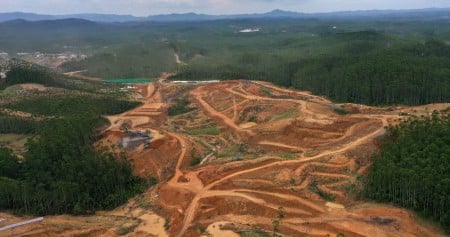Why does IKN is not a big deal for some reasons?

I have heard so many news, about the move of the Indonesian capital city from Jakarta to Nusantara in East Kalimantan has been a controversial topic, with concerns about its impact on inequality. While the government argues that the move will help to reduce inequality by spreading development beyond Java, others argue that it will exacerbate existing inequalities and create new ones.
So, which one is make any sense?
To begin this post, I would like to give the disclaimer first.
- This post presents my personal view based on a quick research I conducted, based on the available references.
- I have no intention of supporting any particular political party. So, I am representing myself as an individual. Political is not my passion and capacity. I'll try to maximize the objectivity, but of course It may not be perfect due to limited time, so take it or leave it.
- To make it easier to understand, I will simplify some points but not oversimplifying them. Of course with my own style, free from any discrimination. If you find unethical part, please report it to me, and I will remove it without defending it.
What is the actual meaning of IKN?
IKN stands for Ibu Kota Nusantara, and the President is attempting to relocate Indonesia's capital city from DKI Jakarta to East Kalimantan. I believe many of us are wondering whether this move will bring advantages or disadvantages to Indonesia's economy, society, and political landscape.
Budget Concerns
There will be huge concerns on the budgeting side. Imagine, this Priority National Strategic mega-project is expected to cost a freaking 466 trillion rupiahs, It equivalent to 30 billion USD. I think It's possible to build a star-trek spacecraft from that budget. But never mind. I am not a huge fan of star-trek series. I am well-aware that this budget is way too high and dangerous if they are not assessing it carefully.
However, I found the scheme of IKN budgeting is divided into three parts:
- The State Budget (APBN) is expected to supply IDR 90.4 trillion, (20%)
- Businesses/private sectors will provide IDR 123.2 trillion, and (30%)
- Public Private Partnership (KPBU) will contribute IDR 252.5 trillion. (50%)
However, it should be noted that the figures listed in the 2020-2024 National Medium-Term Development Plan (RPJMN) are still indicative and It's not yet fixed. As discussions on the development planning of IKN by Bappenas and sector ministries progress, the funding needs and indications of funding schemes still have the potential to change, especially as the government is currently focused on handling the Covid pandemic and national fiscal consolidation in 2023.
However, the thing is that the development of the IKN will occur in five phases, so the total budget of 466 trillion won't be spent all at once. In 2024, the government will only launch the first phase, which will utilize 90 trillion rupiahs of the budget (20%). The remaining budget will then be gradually spent until 2045.

So, based on the budgeting schemas, it's clear that evaluations will be conducted periodically. This allows for revisions based on dynamic dialogues and changes in the national landscape. From this perspective, I gained new insight that the budget could potentially be optimized or (possibility) reallocated towards sectors of greater need.
So, time-domain is still exist here. If there is no time-domain here, for me, it is gambling and dangerous, man.
Some questions
Woi, IKN 400 triliun, di sisi lain kan bisa digunakan buat mendevelop kota-kota kecil lain sehingga bisa menumbuhkan ekonomi, dan bisa dialokasikan ke hal yang lebih penting dan urgent?
Once again, I am not a decision maker, but It has already been patented in Law and approved by almost all political parties/factions.
I know that this world is full of trade-offs and decision-making at any level involves balancing differing needs and resources. This is especially true in budget allocation, where funds are finite but the needs are seemingly infinite.
Making decisions about where to allocate resources, such as in the case of Jakarta, requires difficult choices. It might mean addressing immediate concerns over long-term goals, or vice versa. Ultimately, the goal is to make decisions that will result in the greatest overall benefit and reducing the mismanagement of budget.
HOW IF...?
Let's say that I am a new president of Indonesia in 2024. Mr. President Alfian Firmansyah is now controlling all of the budgets. And I am now a generous person.

Mr. President is so handsome.
anyway,
It has already been spent 20% (90 Trillion). So now I have 376 Trillion remaining. And I will decide to allocate this to other provinces/cities instead of continuing the IKN. For me, IKN is not urgent. And I want to equally give it to every province in Indonesia (There are 38 provinces now).
OK.
Indonesia has 93 cities (at 38 provinces), then if we equally divide it: 376/93 = 4 Trillion per city/regencies.
For me, 4 trillion is way too little as threshold of city development to increase GDP per capita. Well, It's just like I am giving "UANG KAGET" more 4 Trillion to APBD at every city.
Can it be manageable by the manpower? will they progressively utilize that UANG KAGET to something that can increase economical value? How will they do that?

Or remember that Tuban citizens? While I am still don't have a concrete programs to increase GDP per capita. I don't have time for that, I will let Governor or City Mayor to make proper programs for it. I only need to review their programs from my kingdom.
Probably Infrastructure development? Startup investment? Education for low income? Reducing the index of Stunting babies? Reducing poverty by giving them tanah usaha or pinjaman modal and 499+ more programs. It's way too complex for me to review variety of programs, since every city has its own strength and different culture and public behavior. Now I am being a super busy president ever, to listen and review the programs. Leading my brain to burn-out. hahah.
Yes, overseeing and reviewing multiple programs all at once simultaneously can be incredibly challenging. Who will control them and their outome? If not careful, and because I was too tired to control, it is leading a situation that resulting worst-case scenario of mismanagement, corruption, and an uneven distribution of resources, or "bagi-bagi kue."
It more opens corruption gateways.
This could lead to money being used inefficiently or unethically, and sadly, even a significant amount like 4 trillion could vanish without making the intended impact. This highlights the importance of transparency, effective management, and strong anti-corruption detector?
Anyway, FYI, we can even find it easily, the current APBD at every province and city/sub-city here at this link: https://djpk.kemenkeu.go.id/portal/data/apbd
So I personally think 466 Trillion is way too little to develop GDP per capita "for every city/province" in Indonesia, it was too little, as threshold to push for Indonesian economy advancement and we need more than that, It's more dangerous and so it highly-cost compared than IKN itself make it not make any sense now. So.. realization of the "equality" ...
BY GIVING 4 TRILLION ONLY ONCE AT A LIFETIME TO CITIES?
It's funny. And now I am being a cute president ever in Indonesian history. Even I am now confused with my initial decision.
Since the success metric of an advanced nation like "Indonesia Negara Maju" is a year-on-year increase in GDP per capita, right? Not just a one-time occurrence. This is where we understand the source of economic sustainability.
Rethink whether this approach is valid. I mean, we aim to increase equality in every city in Indonesia overall, but we certainly don't want mismanagement to happen, right? It's kinda hard man. We also want to avoid budget vulnerability, which could lead to repeated instances of corruption that may spiral out of control. Therefore, if this approach can be validated, it would be the grandmaster design - a detailed framework. Exact, mature, secure and future-proof design.
Yes, we need time-domain also exist here. But I personally will let other cities grow "organically". I love being organic. Rebalancing the manpower quality, investment and our potential outcome. So, "Uang Kaget" It's nearly giving an instant gratification, which is not quite wise for decision at all, nor giving contribution to a GDP per capita growth year-on-year.
Oh sh**, Do I forget something about the abandoned land in East Kalimantan from initial development 20% of IKN? oh sorry for that. Let's forget it. Let it be a forest again hehehehew~ I'am a great president ever.
Other Questions
IKN cuma bikin Ketimpangan baru.


I don't want to highlight which one is correct or which one is incorrect. Both are true and valid, depending on the outcome.
However, It is also still too early to say definitively how moving the capital city will impact inequality. "As it will be accomplished in all phases in 2045" so "barangnya aja belum jadi", therefore this could only acknowledged as "assumption" or "opinion".
The more important thing is to be aware of the potential risks and to take steps to mitigate them. The government should ensure that the development of the new capital is inclusive and sustainable, and that it benefits all Indonesians, not just the wealthy and well-connected.
Equality.
As long as time-domain is exist, which is gradually/considerably improving in long-term benefit, it could be fine.
Other Questions
Jakarta masih layak buat jadi Ibukota negara.
Geologically, geographically, and historically, Jakarta is not properly designed as the capital city. You know, the urban planning in Jakarta is now too complex and difficult to fix. Even if it could be fixed, it would require a lot of money and also impact the citizens of Jakarta. And the result is still gambling for overall Indonesian economic growth, especially for GDP per capita.
Middle-income trap is real?
For example, we would need more "mega drains", normalization/naturalization, and reclamation which would lead to socio-economic problems again and again. Social conflicts, such as evicting people near "bantaran kali" or any other slums area, take a very long time to resolve. (well it depends on a leader)
As a Jakartan: Air pollution, traffic congestions, and seasonal flooding is too annoying and stressful. How can we increase GDP if we always deal with health problems, caused by bad sanitation and bad air quality?

As a reference, yes, there will also be considerations and challenges for the capital post-migration. But there will also be achievements, as can be seen in the previous image. Several other countries have also relocated their capital city, It's not a new concept and it's still considered quite normal and still on-track and on-control.
Enough has been done to Jakarta. Whomever the next leader of Jakarta is, please fix it little by little.
Jakarta is only 661,5 Km square, if we compared with East Kalimantan, it was 129.067 Km square. It is 200 times larger than Jakarta.

But the population is 3 times fewer than Jakarta. There are big possibilities East Kalimantan have to be a smart city. The economic amplifier effect of this relocation will impact to all region as well.
Well, well well. I will also provide SWOT at the below table to get the overall image of IKN.
| Strength | Weakness | Opportunity | Threats |
|---|---|---|---|
| Equitable development | Budget Bloat | Adding investors | Unable to pay-off debt |
| GDP increase | Addition of debt | Becoming a Developed Country | Stalled |
| Addition of jobs | Program efficiency | Cultural unity because it is located in the middle of Indonesia | Corruption |
| Minimum wage increase | The previous focus of the program was disrupted | Increasing wages per capita | Another program was abandoned |
More Disadvantages
I would say that, yes It's valid that IKN will have bad downside. Especially for Environmental damage. Like deforestation.

The shift to a new National Capital can impulse a potential threat to both flora and fauna, despite in maintaining the ecosystem. Increased incursions into the wildlife habitat may escalate the risk of human-animal conflicts, with emerging instances such as those involving crocodiles. The development of IKN could risk the well-being of the mangrove ecosystem in Balikpapan Bay, which spreads across an area of 2,603.41 hectares.
Maybe yes, furthermore, again the migration to IKN can contribute to pollution and environmental degradation by escalating the risk of forest fires, oil pollution, nutrient depletion in coastal and marine zones, and contamination of groundwater from unclosed mining pits, thereby obstructing community logistic routes (Raharjo, 2023). So government needs to KEEP YOUR EYES ON THIS THE SAME POTENTIAL PROBLEM. Make policy making and urban planning as greenest as possible as you can.
In social impact, based on historical evidence that local/regional development and industrialization often outpace the local population's readiness to participate, due to factors such as limited education and other structural circumstances. As a result, local residents often become mere spectators, unable to engage in transformative processes like the construction of IKN Nusantara. These are the social issues that need to be predicted and prevented. The government needs to ensure that as manpower is absorbed to create new jobs, the quality of education is also enhanced.
Big deal or not a big deal?
Santai dulu nggak, sih?
Though questions remain, the potential of IKN to reshape Indonesia's narrative is undeniable. Will IKN become a beacon of progress and sustainability, or simply a monument to ambition? Time will tell. Only time will tell if IKN lives up to its lofty ambitions, or falls prey to the pitfalls of grand-scale projects. We must remain vigilant and engaged. As spectators in this narrative, our duty is to stay alert and involved.
Thank you for visiting! Cheers~





